
The digital marketing world has changed dramatically. Traditional SEO, once the main driver of online visibility, now competes with a new approach that’s redefining how brands reach their audiences: Generative Engine Optimization (GEO).
Executive Summary: The AI Search Revolution
As AI-driven search tools like ChatGPT, Google’s AI Overviews, Perplexity, and Claude change the way people find and use information, marketers are racing to adjust. The pressure is intense. Gartner predicts that traditional search traffic will fall by 25% by 2026, with even sharper declines expected through 2028 as more users turn to generative engines.
This isn’t just another marketing trend. It’s a fundamental change in how online discovery works. Success is no longer about ranking at the top of search results. It’s about being the trusted source that AI platforms reference when delivering answers.
Bottom line: Brands that start building strong GEO strategies today will gain a major competitive edge as AI search takes over. The real question isn’t whether to invest in GEO, but how fast you can develop the capabilities to succeed in an AI-first search landscape.
In this guide, we’ll break down the 15 best GEO tools of 2025, covering their features, pricing, strengths, and best use cases. Whether you’re leading a Fortune 500 company or scaling a startup, you’ll find practical insights to help you navigate the shift to AI-driven search optimization.
What Is Generative Engine Optimization (GEO)?
Generative Engine Optimization (GEO) is the practice of shaping your content and digital presence so it shows up in AI-generated answers on platforms like ChatGPT, Google AI Overviews, Perplexity, Claude, and Gemini.
The difference is key. Traditional SEO is about driving clicks and getting users to your site through search results. GEO is about earning citations, being the trusted source that AI tools rely on when giving direct answers.
Key GEO Components:
- Content Authority: Creating information that AI systems recognize as credible and cite-worthy
- Semantic Optimization: Structuring content for AI comprehension rather than keyword density
- Multi-Platform Presence: Building visibility across the diverse sources that AI systems scan
- Brand Mention Strategy: Earning citations even without traditional backlinks
- Technical Accessibility: Ensuring AI crawlers can access and understand your content
The Market Reality
The data tells a compelling story about why GEO has become essential:
- ChatGPT Growth: Reached 400 million weekly users by February 2025, demonstrating unprecedented adoption that is growing rapidly
- Google AI Integration: AI Overviews now appear on 13.14% of all searches as of March 2025, up from 6.49% in January
- Traffic Redistribution: Semrush research predicts LLM traffic will overtake traditional Google search by late 2028
- User Behavior Shift: 71% of Americans report using AI to search for information online
Early adopters are already seeing results. Companies implementing comprehensive GEO strategies now attribute 32% of their sales-qualified leads to generative AI search, up from zero just months ago.
The 15 Best GEO Tools for 2025: Detailed Analysis
1. Atomic AGI
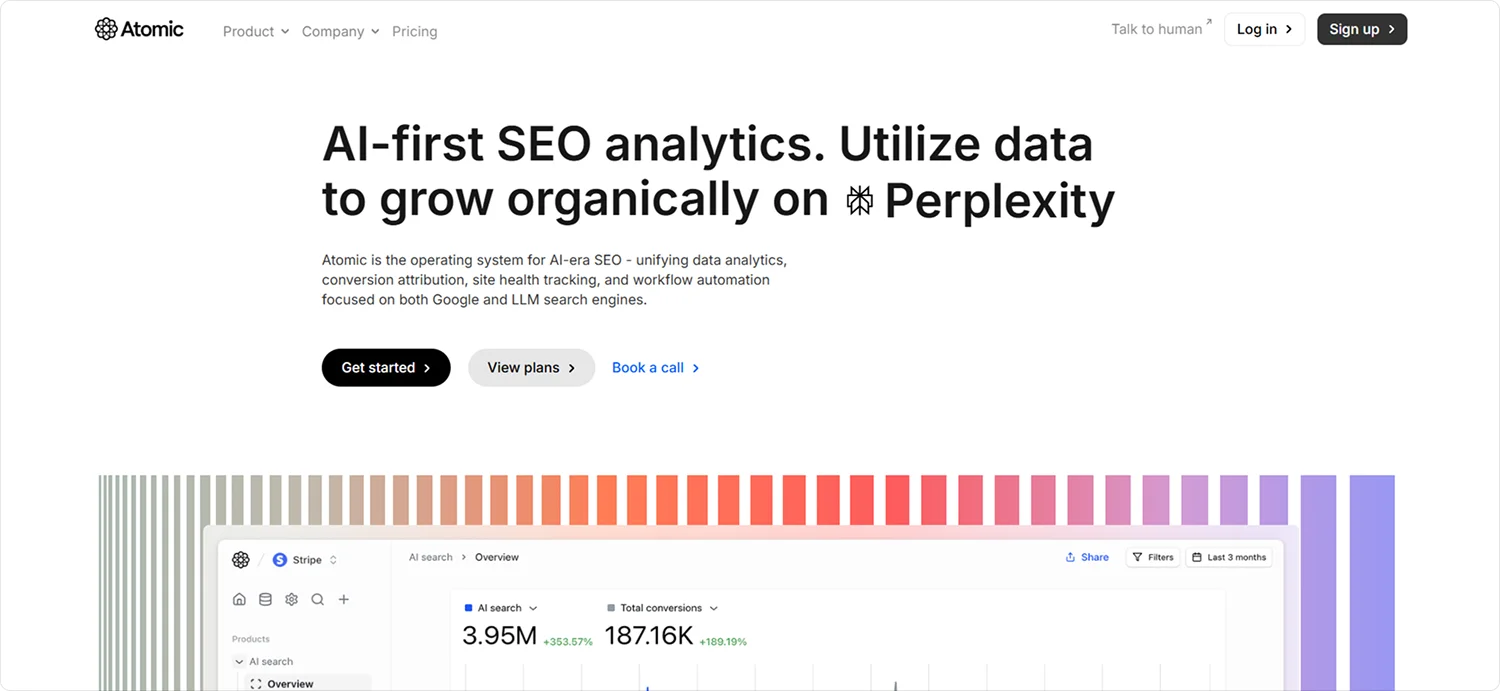
Pricing: Free tier available to start; paid plans scale from an affordable entry point ($10/mo Starter) up through team and enterprise tiers.
Atomic AGI is an AI-driven SEO analytics and attribution platform that brings together SEO analytics, conversion attribution, technical site health, and automation, while tracking both traditional Google search and emerging LLM and generative engines.
Key Features:
- AI Visibility Monitoring: Tracks traffic and behavior coming from generative engines (ChatGPT, Perplexity and others), so you can see which pages capture AI referrals.
- AI Optimization: Actionable diagnostics that tie intent, keywords and conversions to pages - helps prioritize fixes that move the needle.
- Content Analysis & Editor: NLP-driven content analysis and an editor to identify content gaps, cluster topics, and surface improvement opportunities for AI and search.
- AI Search Analytics & Attribution: Blends search/AI signals with conversion data (connects to GSC & GA4) so you can attribute revenue and growth to AI/search activities.
Strengths:
- Analytics, AI-search tracking, technical audits and reporting live in one product (reduces tool sprawl).
- Strong privacy posture and EU hosting / GDPR compliance for teams concerned about data residency.
- Fast setup and automation focus, designed to save time and lower headcount dependency.
- Enterprise orientation: powerful attribution and reporting features geared toward business outcomes rather than raw traffic numbers.
Limitations:
- If your team already has a well-developed martech stack, you can run Atomic alongside specialized point tools instead of replacing everything right away.
Verdict: Atomic AGI is an excellent pick for teams that want a single, AI-native platform to measure and optimize both Google and LLM-driven search, especially where attribution and business outcomes matter. It’s ideal for teams of all sizes, ready to invest in an AI-first SEO stack and replace multiple tools with one unified system.
2. Goodie AI

Pricing: Custom enterprise pricing
Goodie AI has established itself as the leading AI-native platform specializing in Generative Engine Optimization. Founded by experts who previously worked at major tech companies, the platform offers a comprehensive suite of GEO tools available in 2025.
Key Features:
- AI Visibility Monitoring: Tracks brand visibility across all major LLMs and AI search platforms with granular detail
- AI Optimization Hub: Provides precise, actionable recommendations for improving AI search visibility
- AI Content Writer: Identifies content gaps and assists in creating optimized content specifically for AI consumption
- AI Search Analytics & Attribution: Measures and attributes AI search performance to business metrics like revenue and user growth
Strengths:
- Most comprehensive platform coverage, including newer models like DeepSeek
- Highly precise optimization recommendations with clear implementation guidance
- User-friendly interface designed specifically for AI search optimization
- Strong focus on business outcomes rather than vanity metrics
Limitations:
- Premium pricing may be prohibitive for smaller businesses
- As a newer platform, some traditional SEO tool integrations are still developing
- No report export feature currently available
Verdict: Goodie AI represents the gold standard for enterprise GEO optimization. While the investment is significant, the platform's comprehensive approach and actionable insights make it ideal for businesses serious about dominating AI search visibility. Companies typically see 200-400% increases in AI citations within six months of implementation.
3. Semrush AI Toolkit
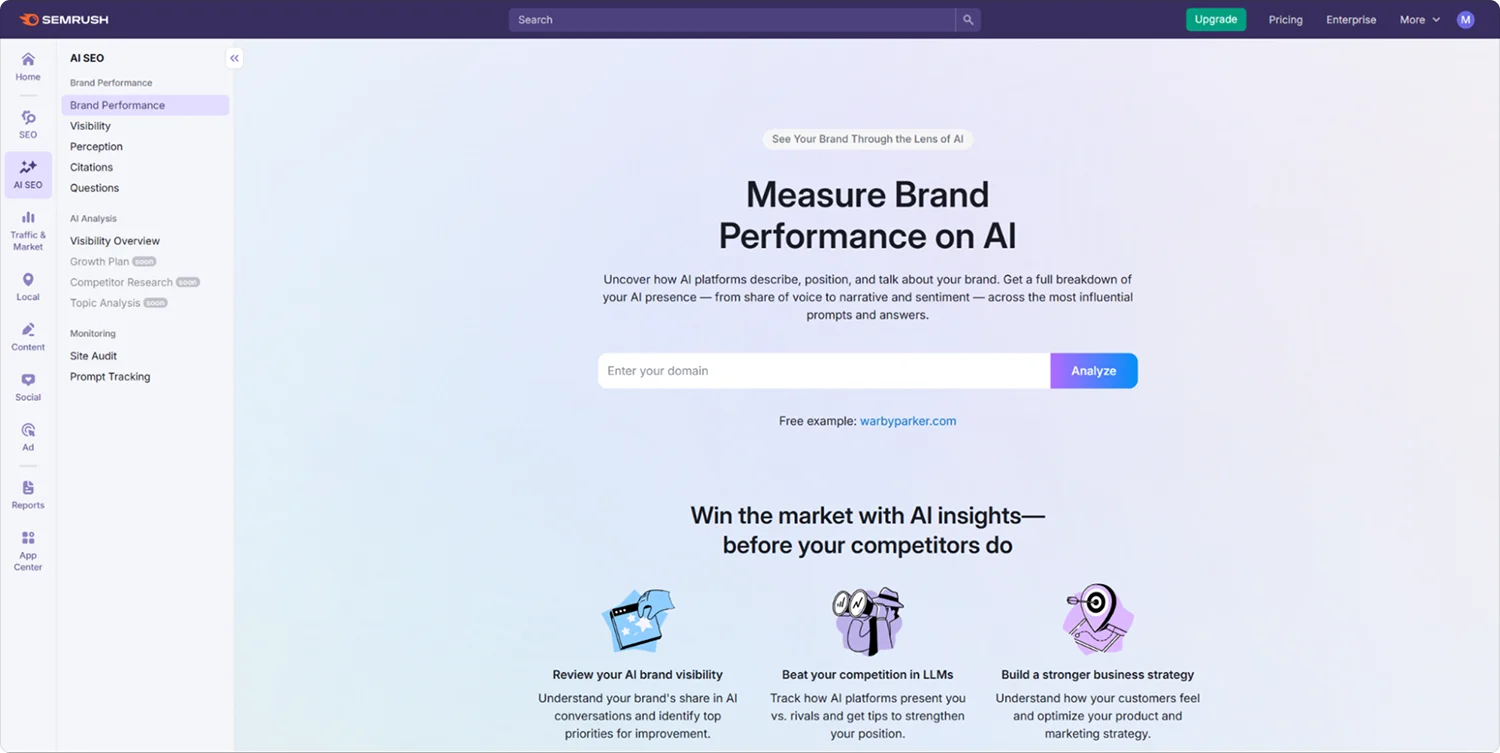
Pricing: $99/month for AI SEO Plan
Semrush's entry into the GEO space leverages their massive SEO data capabilities and existing customer base. The AI Toolkit provides AI visibility analysis alongside traditional SEO metrics, making it attractive for teams seeking unified reporting.
Key Features:
- 360° AI Visibility Analysis: Comprehensive view across top LLMs and Google's AI Mode
- Competitive AI Benchmarking: Compare brand performance against competitors in AIgenerated responses
- Strategic Business Recommendations: AI-generated insights for content, positioning, and business strategy
- Question-Level Rankings: Track performance for specific AI prompts and user queries
Strengths:
- Seamless integration with existing Semrush workflows
- Robust competitive analysis capabilities
- Strategic recommendations based on extensive data analysis
- Familiar interface for existing Semrush users
Limitations:
- Limited to Google-centric AI features compared to specialized GEO platforms
- Enterprise-only availability restricts access for smaller businesses
- Less specialized optimization guidance compared to AI-native platforms
Verdict: Semrush AI Toolkit works best for established teams already invested in the Semrush ecosystem. While not as specialized as dedicated GEO platforms, it provides solid fundamentals with the convenience of unified reporting.
4. AthenaHQ
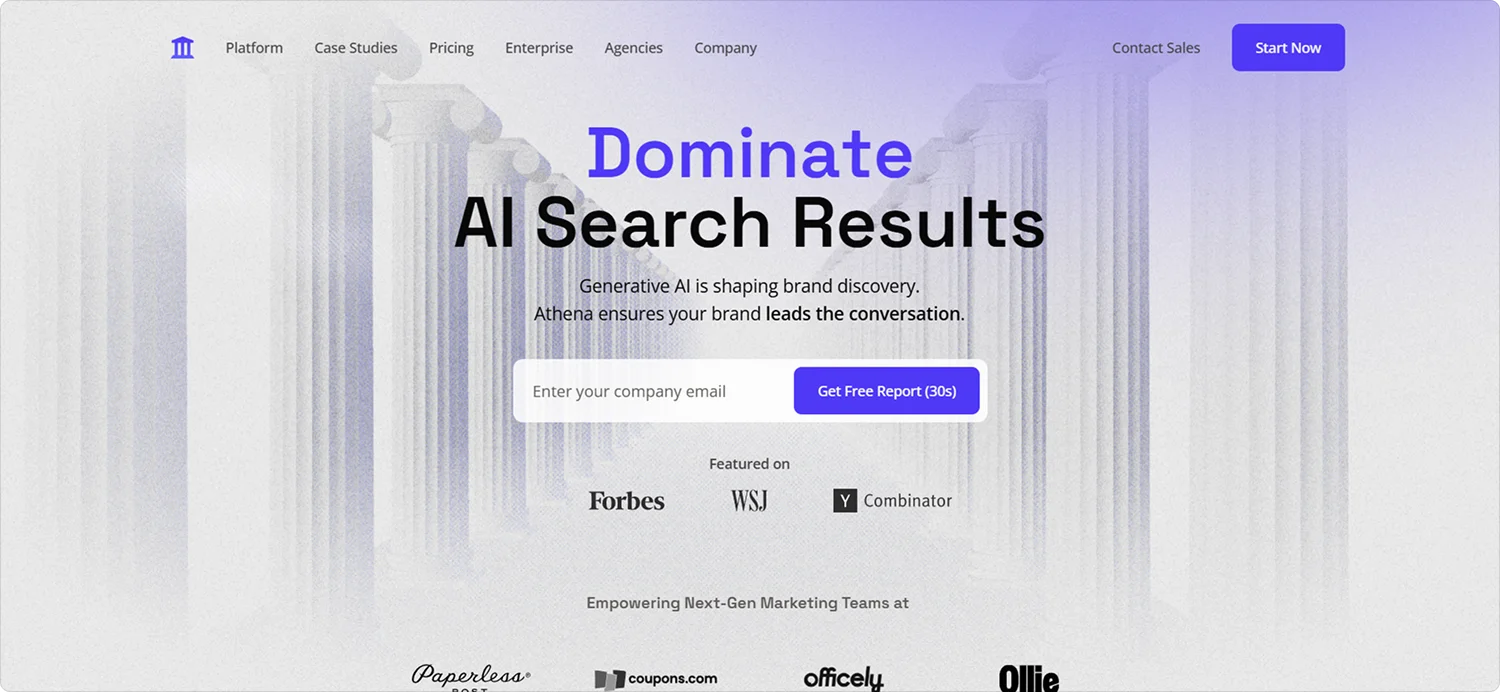
Pricing: Starting at $295+/month with custom enterprise pricing
Founded by former Google Search engineer Andrew Yan and AI specialist Alan Yao, AthenaHQ brings deep technical expertise to GEO optimization.
Key Features:
- Olympus Dashboard: Unified GEO score combining citation count, sentiment, and traffic impact
- Prompt Analytics: Shows natural-language queries triggering AI responses
- Competitor Benchmarking: Monitors competitor citations and share-of-voice trends
- AI-Driven Action Center: Generates specific optimization recommendations
Strengths:
- Founded by AI and search industry experts
- Comprehensive analytics with actionable insights
- Strong competitive analysis capabilities
- Transparent pricing structure
Limitations:
- Premium pricing targets enterprise market exclusively
- No free trial available for evaluation
- Limited content optimization features compared to some competitors
Verdict: AthenaHQ excels for enterprise organizations with substantial budgets seeking expert-driven GEO optimization. The platform's technical foundation and actionable insights justify the investment for large-scale operations.
5. Profound
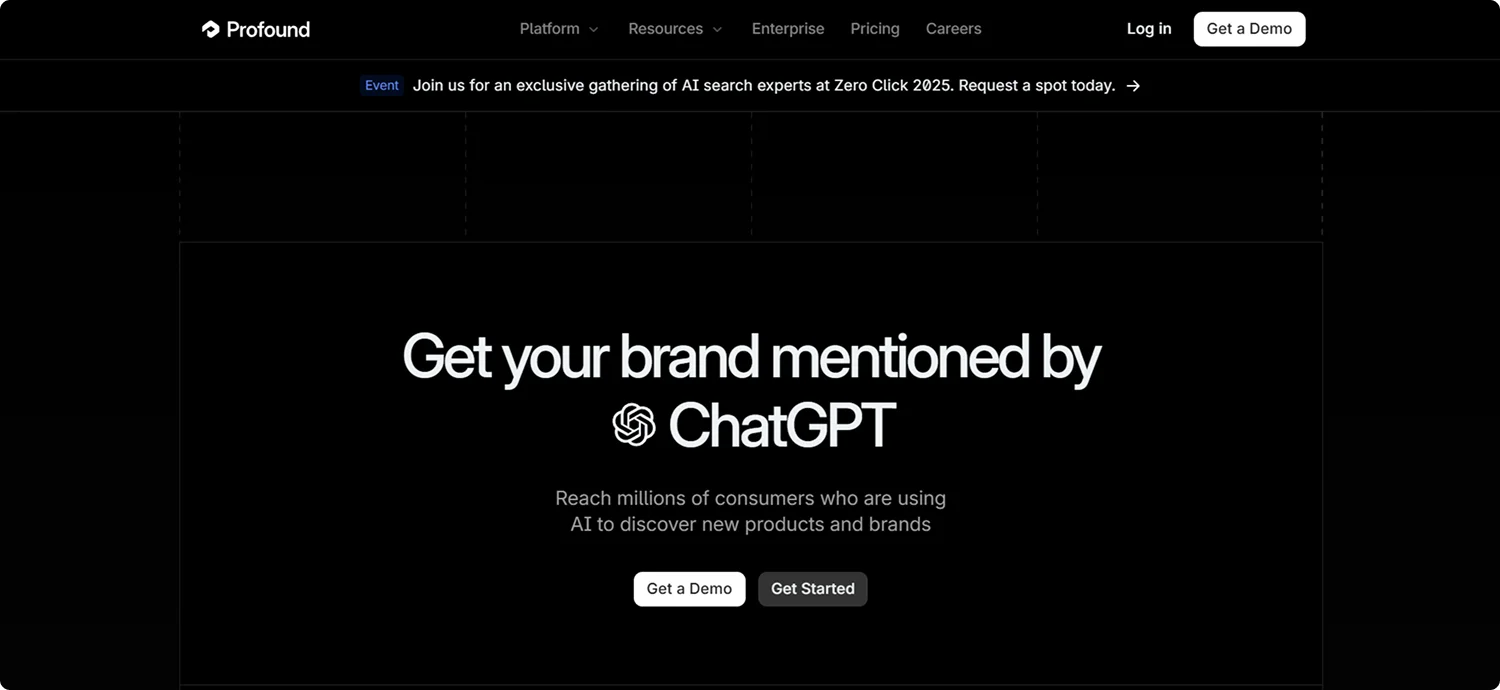
Pricing: Starting at $499/month, custom enterprise pricing available
Profound has positioned itself as the enterprise-grade analytics platform for GEO optimization.
Key Features:
- Answer Engine Insights: Detailed visibility percentage, ranking, and sentiment analysis
- Conversation Explorer: Topic demand analysis in AI prompts
- Actions Workflow: Systematic approach to remediate brand misrepresentation
- Citation Drift Research: Analysis of how AI citations change over time
Strengths:
- Highly detailed analytics with statistical robustness
- Strong enterprise features including multilingual support
- Early mover advantage with established VC backing
- Excellent for large-scale brand monitoring
Limitations:
- Analytics-focused with limited content optimization features
- Premium pricing restricts access to enterprise clients only
- Primarily monitoring rather than actionable optimization
Verdict: Profound serves enterprise clients exceptionally well when detailed analytics and brand monitoring are priorities. However, the platform requires additional resources to translate insights into optimization actions.
6. Otterly AI
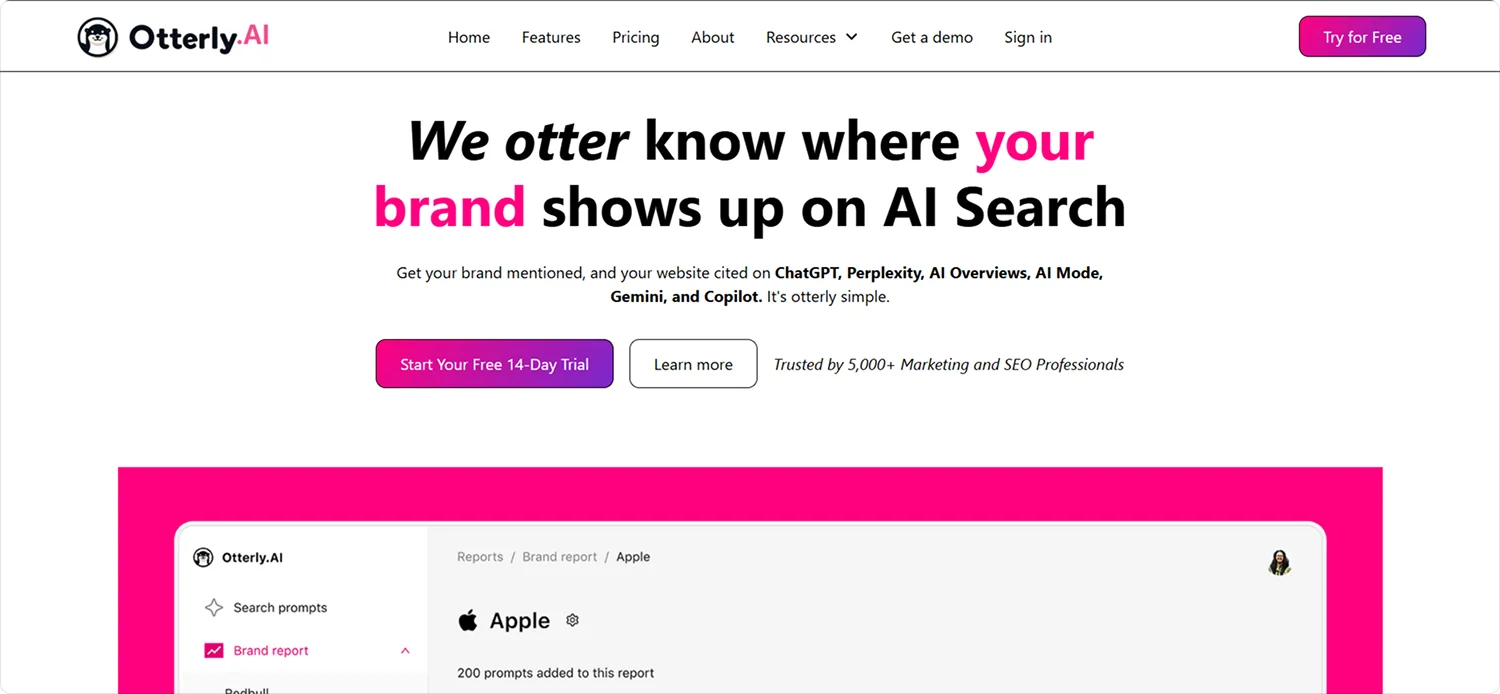
Pricing: Lite: $29/month (15 prompts), Standard: $189/month, Premium: $489/month
Otterly AI has carved out a niche as the most practical GEO tool for teams focused on specific prompt monitoring. The platform excels at tracking brand mentions and link citations across AI platforms with an intuitive, user-friendly interface.
Key Features:
- Automated Link Citation Detection: Identifies when AI platforms cite your content with links
- AI Prompt Discovery: Generates relevant prompts based on your business and industry
- Brand Visibility Index: KPIs and exportable reports for visibility tracking
- Sentiment Analysis: Tracks positive, negative, and neutral brand mentions
Strengths:
- Most affordable entry point for GEO monitoring
- Intuitive interface ideal for non-technical users
- Strong focus on prompt-level performance
- Excellent customer satisfaction ratings (5.0/5 on Product Hunt)
Limitations:
- Limited optimization recommendations compared to enterprise platforms
- Basic analytics capabilities
- Smaller platform coverage compared to comprehensive solutions
Verdict: Otterly AI represents the best value for small businesses and startups beginning their GEO journey. While not as comprehensive as enterprise solutions, it provides essential monitoring capabilities at accessible price points.
7. Writesonic GEO
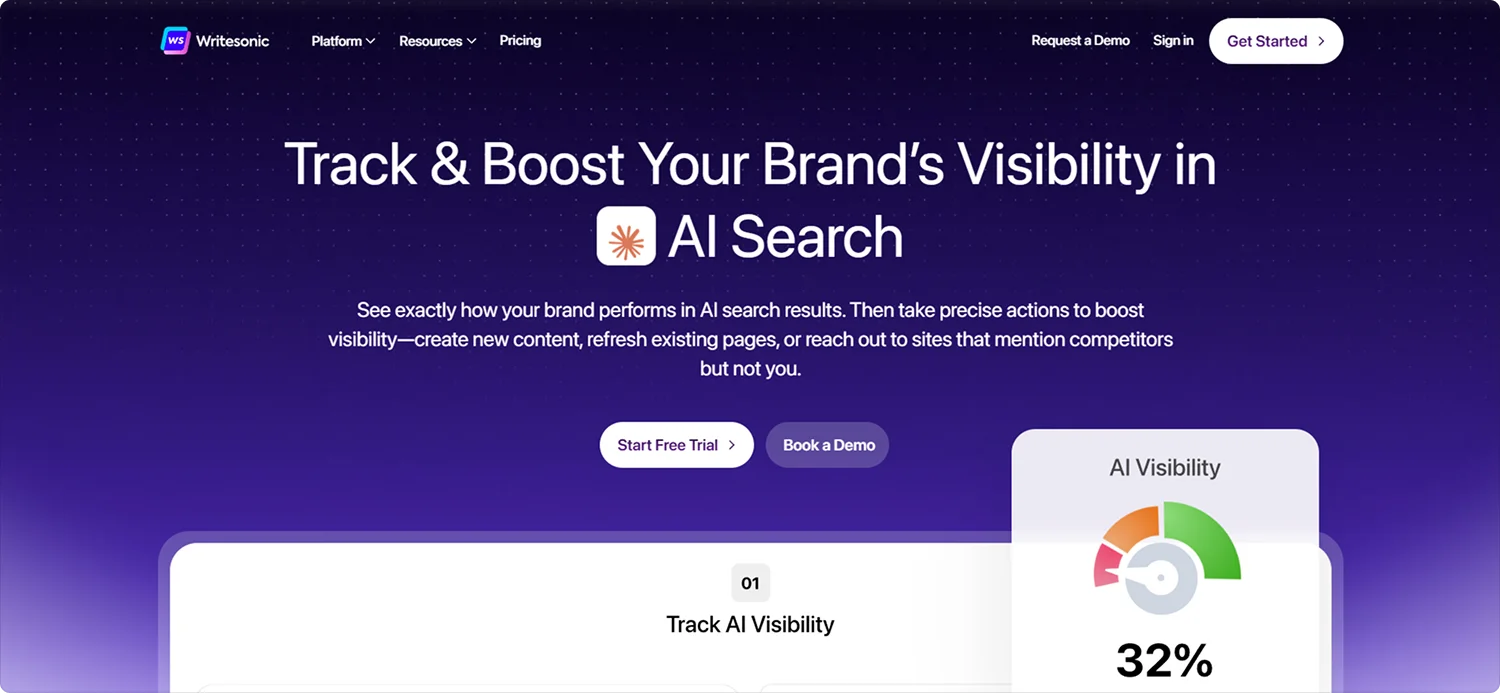
Pricing: Starts from $39/month, AI Search Tracking features start from $199/month.
Writesonic has differentiated itself by combining content creation capabilities with GEO analytics. This integration allows teams to identify optimization opportunities and create improved content within the same platform.
Key Features:
- Brand Presence Explorer: Comprehensive visibility and sentiment tracking
- AI Traffic Analytics: Insights into which AI bots crawl your site and prioritize specific pages
- Prompt and Citation Analysis: Identification of content gaps and optimization opportunities
- Built-in Content Creation: AI writing tools optimized for generative engine visibility
Strengths:
- Unique integration of analytics and content creation
- Comprehensive approach combining traditional SEO and GEO optimization
- Strong value proposition compared to separate tool subscriptions
- Immediate ability to act on optimization insights
Limitations:
- Newer entrant with less established market presence
- Content quality may vary compared to specialized writing tools
- Limited enterprise features compared to dedicated GEO platforms
Verdict: Writesonic GEO Suite works exceptionally well for content-focused teams seeking an integrated approach. The platform's ability to identify opportunities and immediately create optimized content provides unique value.
8. Scrunch AI
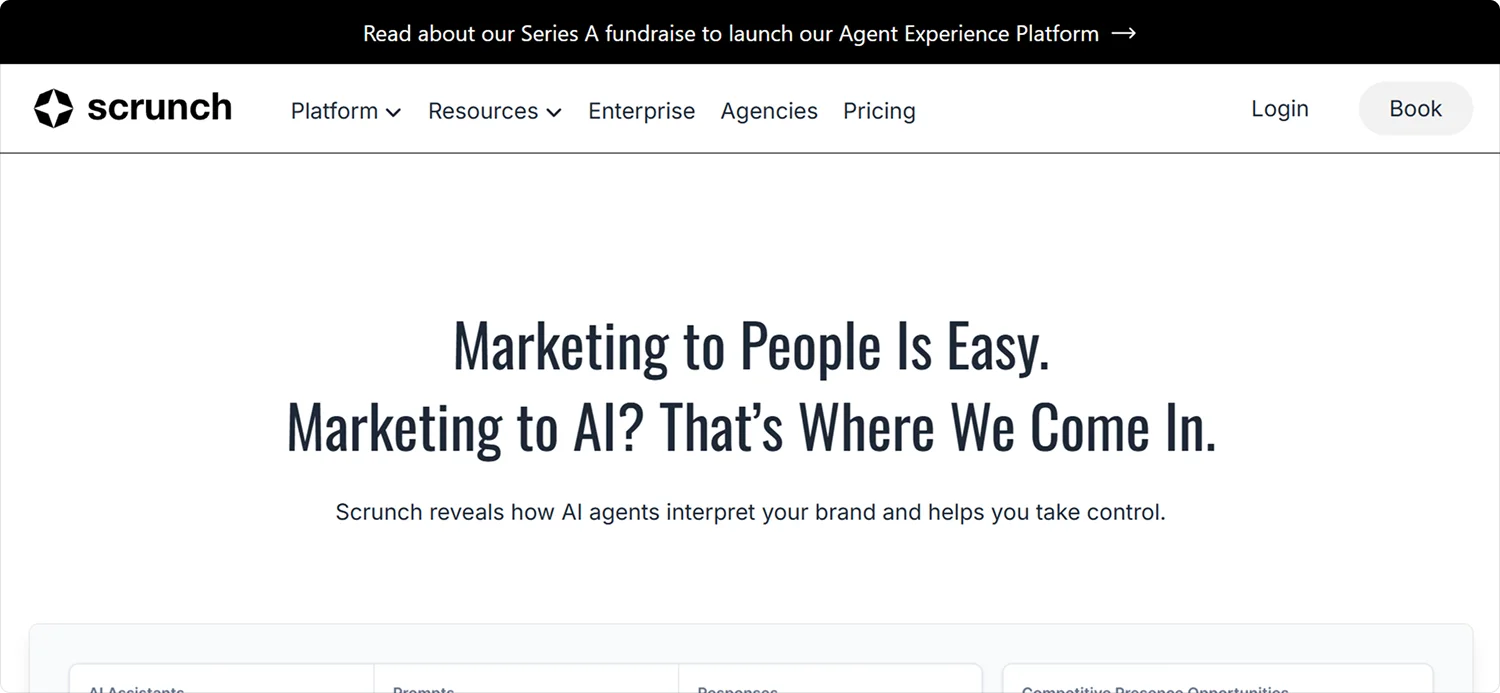
Pricing: Starter plan at $300/month, $1,000/month for Pro plan, and Enterprise plan
Scrunch AI specializes in helping enterprise teams detect and correct false narratives in AI-generated responses. The platform focuses heavily on brand safety and reputation management within AI search environments.
Key Features:
- Real-time Visibility Monitoring: Continuous tracking across major AI platforms
- Misinformation Detection: Proactive identification of inaccurate brand information
- Search Journey Mapping: Analysis of AI-driven customer interactions
- Competitive Analysis: Brand performance comparison in AI-generated answers
Strengths:
- Strong focus on brand safety and narrative control
- Excellent for reputation management in AI environments
- Comprehensive enterprise features
- Proactive approach to misinformation detection
Limitations:
- No self-service options; requires enterprise sales engagement
- Limited content optimization features
- Premium pricing restricts access to large organizations
Verdict: Scrunch AI excels for enterprise brands prioritizing reputation management and narrative control in AI search. The platform's focus on brand safety makes it valuable for companies in regulated industries.
9. Peec AI
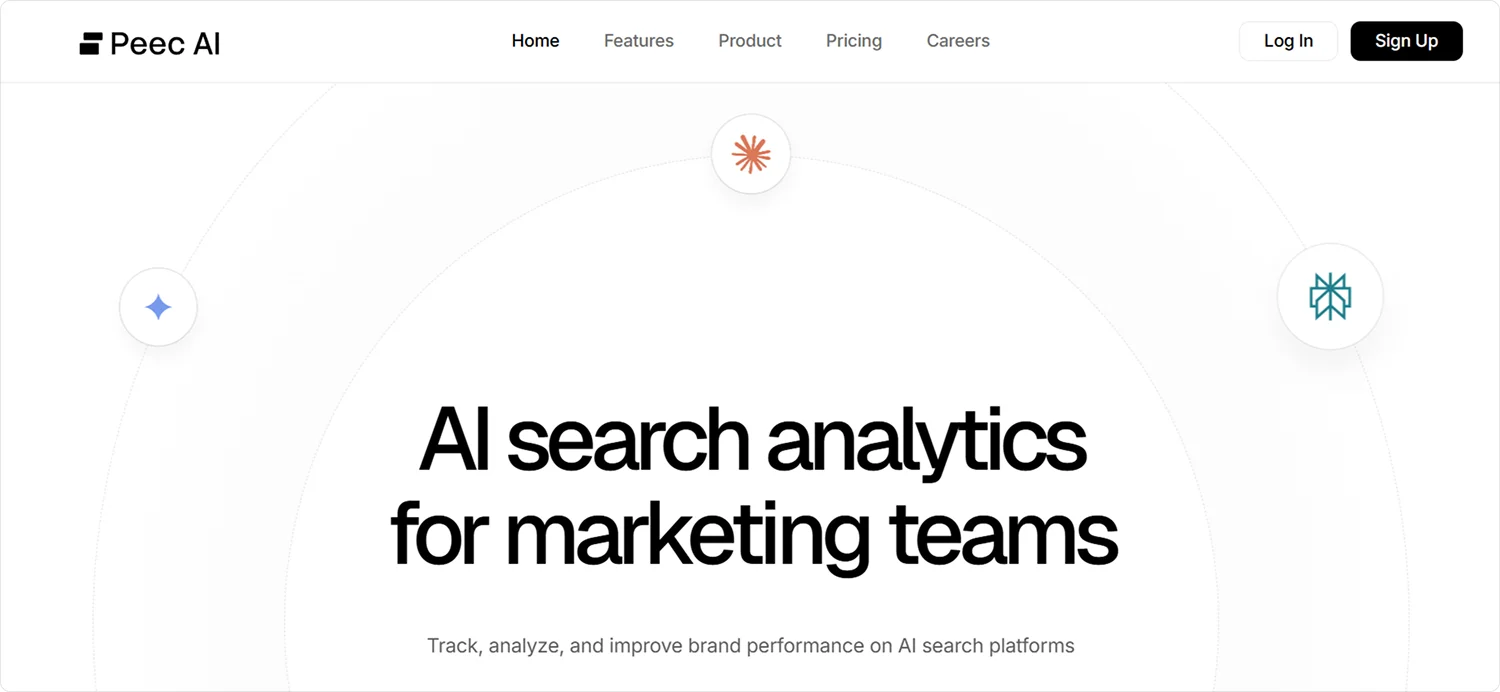
Pricing: Plans at €89-€499/month
Peec AI distinguishes itself through real-time alerting capabilities and straightforward analytics. The platform focuses on providing immediate notifications when brand visibility changes across AI platforms.
Key Features:
- Real-Time Visibility Alerts: Immediate notifications for significant ranking changes
- Custom Prompt Monitoring: Track specific queries relevant to your business
- Source Attribution Analysis: Identify which websites AI responses cite most frequently
- Competitive Ranking Comparison: Measure performance against industry competitors
Strengths:
- Excellent real-time alerting system
- User-friendly interface with clear analytics
- Affordable pricing for European market
- Fast implementation and setup
Limitations:
- Basic feature set compared to comprehensive platforms
- Limited optimization guidance
- Smaller platform coverage
Verdict: Peec AI serves teams well when real-time monitoring and immediate alerts are primary concerns. The platform provides essential tracking capabilities without overwhelming complexity.
10. XFunnel
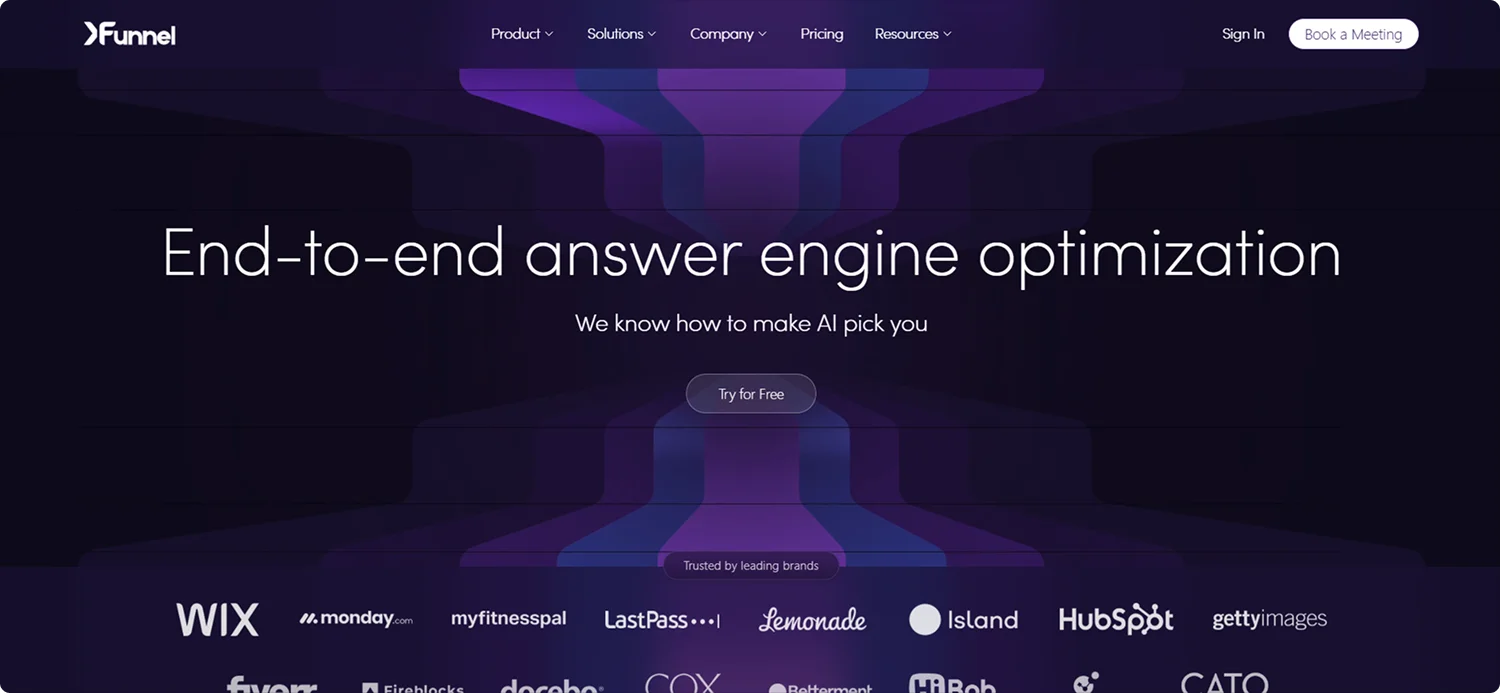
Pricing: Custom pricing with free AI search audit
XFunnel takes a unique approach by analyzing brand visibility at each stage of the customer journey. The platform's "Buying Journey Analysis" helps identify where potential customers might drop off due to poor AI visibility.
Key Features:
- Buying Journey Analysis: Visibility tracking across awareness, consideration, and conversion stages
- Real-Time LLM Monitoring: Continuous tracking across major AI platforms
- Query Analytics: Discovery of top AI prompts by intent, region, and persona
- Dedicated Analyst Support: Tailored recommendations and optimization playbooks
Strengths:
- Unique customer journey perspective on AI visibility
- Expert support and strategic consultation included
- Comprehensive funnel analysis capabilities
- Actionable insights with implementation guidance
Limitations:
- Custom pricing makes cost evaluation difficult
- Limited public information about platform capabilities
- Newer player with less established market presence
Verdict: XFunnel appeals to sophisticated marketing teams seeking to understand how AI visibility impacts customer acquisition funnels. The platform's strategic approach suits organizations with complex sales processes.
11. Evertune
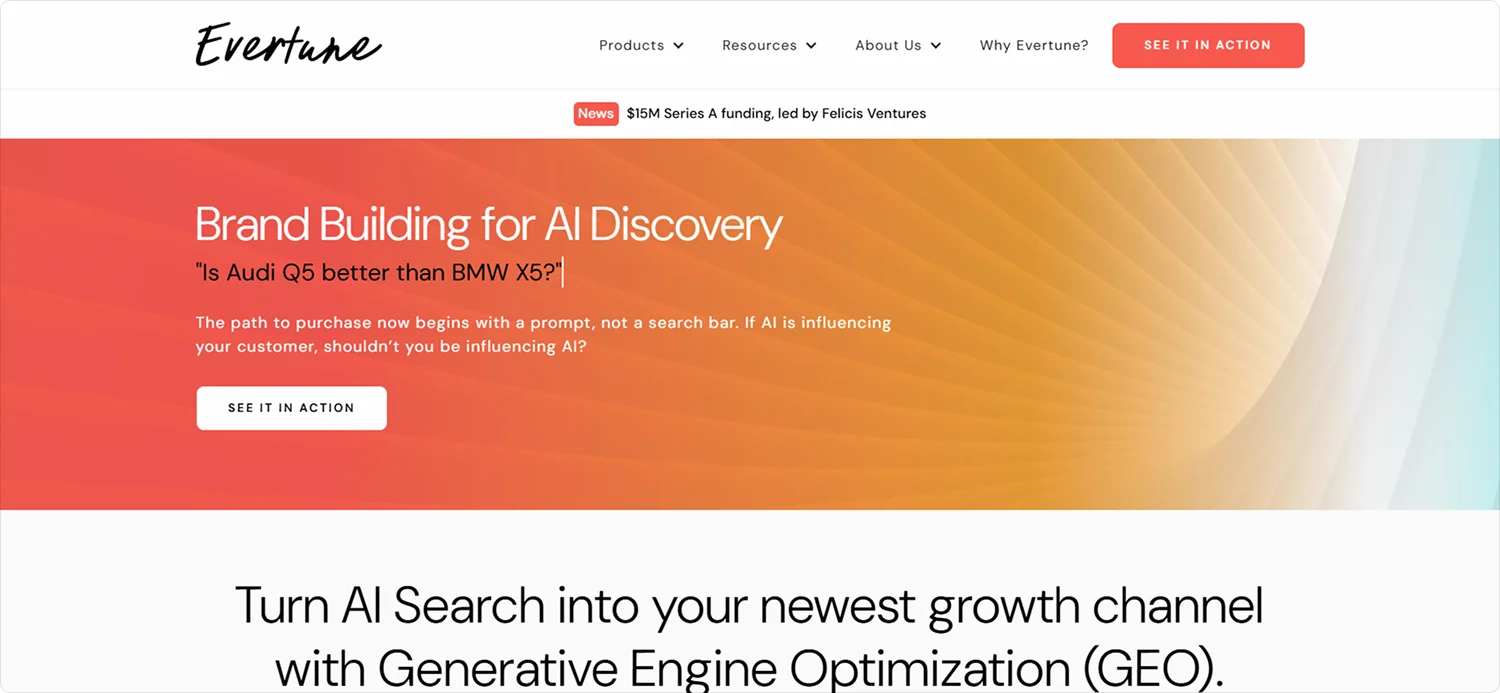
Pricing: Custom enterprise pricing
Evertune focuses specifically on how products, positioning, and messaging appear in AI-generated answers. The platform goes beyond basic visibility metrics to analyze attribute-level brand representation.
Key Features:
- Attribute-Level Analysis: Detailed breakdown of which product benefits AI models emphasize
- Message Gap Detection: Specific recommendations to guide AI narratives
- Influencer and Publisher Mapping: Source identification for AI-generated responses
- Sentiment and Visibility Tracking: Comprehensive brand perception measurement
Strengths:
- Sophisticated analysis of brand messaging in AI responses
- Focus on product positioning and narrative control
- Detailed source attribution analysis
- Enterprise-grade features and support
Limitations:
- Custom pricing lacks transparency
- Limited availability and market presence
- Primarily focused on large enterprise clients
Verdict: Evertune works best for enterprise communications teams managing complex product narratives across AI platforms. The platform's detailed messaging analysis provides unique value for brand positioning.
12. HubSpot AEO Grader
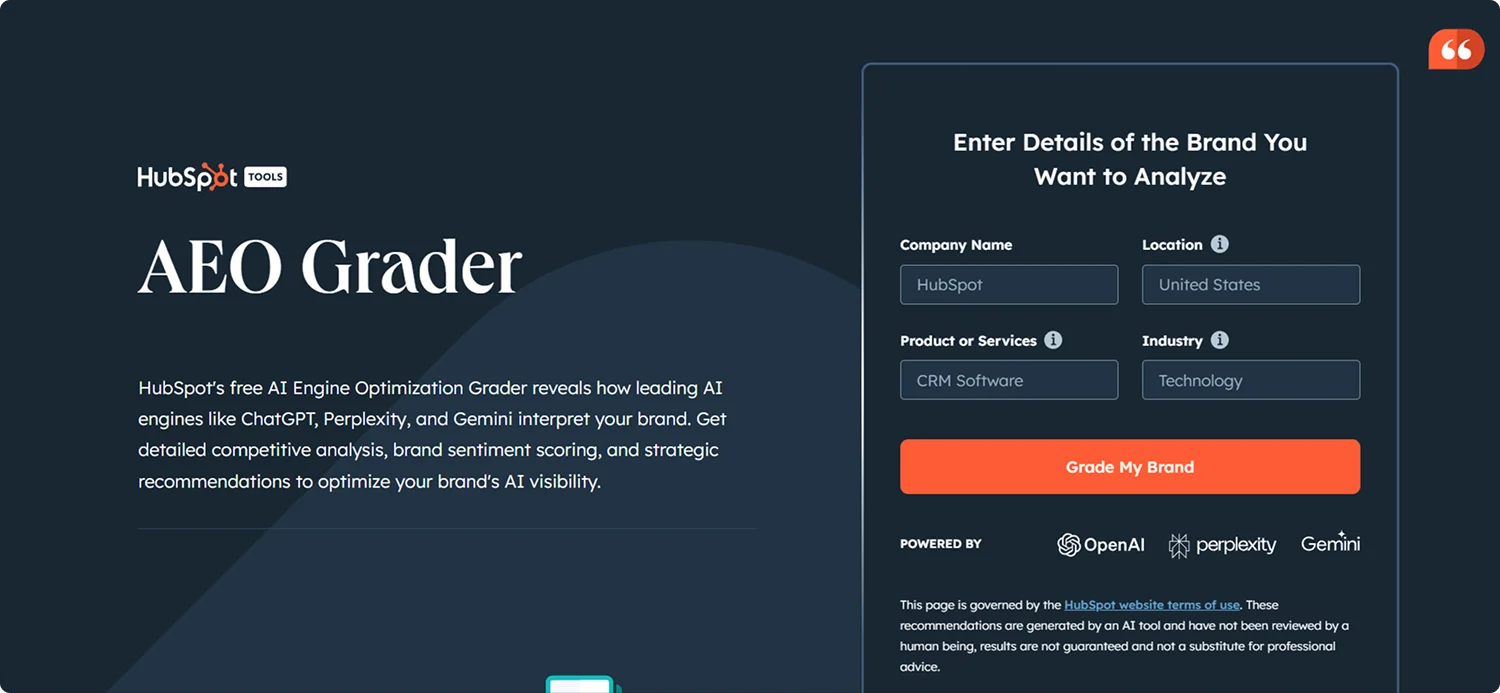
Pricing: Free Tool
HubSpot's AEO Grader provides GEO capabilities within their comprehensive marketing platform. The tool focuses on content optimization for AI-powered search engines while leveraging HubSpot's broader marketing automation features.
Key Features:
- AI Search Content Analysis: Evaluation of content performance in AI search environments
- Semantic Relevance Assessment: Analysis of content alignment with AI understanding
- Competitive Content Comparison: Benchmarking against competitor content
- Integration with HubSpot Ecosystem: Seamless workflow with existing marketing tools
Strengths:
- Natural integration with HubSpot's marketing platform
- Comprehensive marketing automation beyond GEO
- Established customer base and support infrastructure
- Content optimization focus with actionable recommendations
Limitations:
- Limited to HubSpot ecosystem users
- Less specialized than dedicated GEO platforms
- GEO features are subset of broader marketing platform
- Variable pricing based on HubSpot tier selection
Verdict: HubSpot AEO Grader serves existing HubSpot customers well by adding GEO capabilities to their marketing workflows. However, dedicated GEO needs may require specialized platforms.
13. Relixir
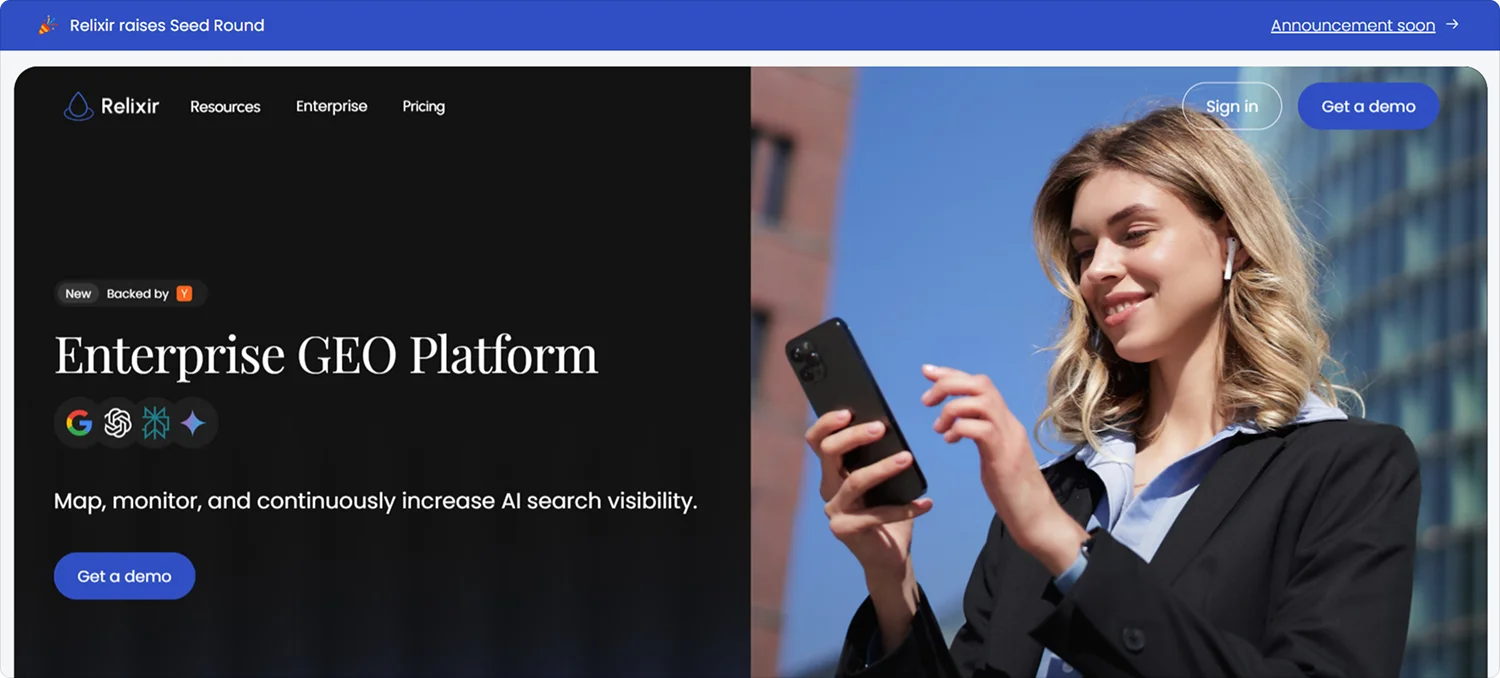
Pricing: Pricing plans coming soon
Relixir differentiates itself by offering automated content deployment capabilities alongside monitoring and analytics. The platform promises <30-day impact timelines through comprehensive automation.
Key Features:
- Automated Content Generation: AI-powered content creation optimized for generative engines
- End-to-End Optimization: Complete lifecycle management from monitoring to deployment
- Enterprise Guardrails: Brand standards and compliance controls for automated content
- Global Coverage: Multi-platform optimization across major AI search engines
Strengths:
- Only platform offering automated content deployment
- Rapid implementation with quick results
- No-code approach suitable for non-technical teams
- Comprehensive automation reduces manual effort
Limitations:
- Custom pricing lacks transparency
- Newer platform with limited market validation
- Automation may reduce content customization options
- Enterprise focus limits accessibility for smaller businesses
Verdict: Relixir appeals to organizations seeking comprehensive automation in GEO optimization. The platform's end-to-end approach provides unique value for teams with limited technical resources.
14. Ahrefs Brand Radar

Pricing: Starts at $99/month for existing plans
While Ahrefs hasn't launched dedicated GEO features, their traditional SEO capabilities provide foundational elements for generative engine optimization. The platform's authority-building tools remain relevant for GEO success.
Key Features:
- AI Overview Tracking: Limited visibility into Google AI Overview appearances
- Brand Radar: Monitoring of brand mentions across the web
- Comprehensive Backlink Analysis: Essential for building authority that AI systems recognize
- Content Gap Analysis: Identification of topics where competitors appear in AI responses
Strengths:
- Established reputation and comprehensive SEO data
- Strong foundational tools for authority building
- Extensive keyword and content research capabilities
- Large user base and educational resources
Limitations:
- No dedicated GEO features or AI platform monitoring
- Limited visibility into AI-specific performance metrics
- Traditional SEO focus may miss AI-specific optimization opportunities
Verdict: Ahrefs remains valuable for building the foundational authority that supports GEO success. However, teams serious about AI search optimization need dedicated GEO tools alongside Ahrefs.
Strategic Implementation Guide
Assessment Phase
- Tool setup and initial brand visibility audit
- Identification of current AI mention frequency and sentiment
- Competitive landscape analysis and gap identification
Optimization Implementation
- Content structure improvements based on platform recommendations
- Technical optimizations for AI crawler accessibility
- Initial content creation targeting identified opportunities
Momentum Building
- First measurable improvements in AI visibility metrics
- Expanded content optimization across identified topics
- Refinement of optimization strategies based on early results
Substantial Impact
- Significant increases in AI citations and brand mentions
- Measurable improvements in brand sentiment within AI responses
- Competitive advantages in key business-relevant AI queries
Strategic Advantage
- Established authority positioning in AI search results
- Sustainable competitive advantages in AI visibility
- Integration of GEO insights into broader content and marketing strategies
Future Outlook: GEO Tools Evolution
Emerging Capabilities
Multimodal Optimization: Next-generation GEO tools will optimize beyond text to include images, audio, and video content for AI platforms that increasingly support multimedia responses.
Predictive Analytics: Advanced platforms will predict which content topics and formats are likely to gain AI visibility before they become widely adopted.
Automated Content Generation: More platforms will integrate content creation capabilities, enabling immediate response to optimization opportunities.
Market Consolidation Predictions
The current fragmented GEO tools market is likely to consolidate through:
- SEO Platform Acquisitions: Major SEO tools acquiring specialized GEO platforms
- Enterprise Platform Integration: Large marketing automation platforms building native GEO capabilities
- Niche Specialization: Smaller platforms focusing on specific industries or use cases
Technology Integration Trends
API-First Development: Future GEO tools will prioritize API access and integration capabilities to fit into existing marketing workflows.
AI Model Diversity: As new AI platforms emerge, GEO tools must adapt to monitor and optimize for an expanding array of generative engines.
Real-Time Optimization: Advanced platforms will provide real-time optimization recommendations based on changing AI platform algorithms and user behavior.
Conclusion: Choosing Your GEO Strategy for 2025
The GEO landscape offers major opportunities for brands ready to adapt to AI-driven search. The tools covered in this guide highlight the best options available today, but the bigger decision isn’t which platform to pick. It’s whether you commit to making GEO a core part of your strategy.
For Immediate Action:
1. Assess Current State: Use free tools to understand your current AI visibility
2. Choose Your Tier: Select tools appropriate for your budget and organizational complexity
3. Start Small: Begin monitoring core AI platforms relevant to your audience
4. Measure and Expand: Track results and gradually expand platform coverage and optimization efforts
Brands that start implementing GEO strategies now will gain a lasting competitive edge as AI search takes the lead. The real question isn’t whether to invest in GEO, but how fast you can build the capabilities to succeed in an AI-first search environment.
If you are ready to start your GEO journey and expand your brand presence in today’s search environment, try Atomic today!
Frequently Asked Questions
1. Do backlinks still matter?
Yes, but quality > quantity; mentions and co-citations also matter.
2. ROI timeline?
6–12 weeks for visibility, 3–6 months for measurable business impact.
3. Can small businesses compete?
Yes, niche expertise often wins.
4 .Which platforms to prioritize?
Start with ChatGPT & Google AI Overviews, expand to Perplexity & Claude.
5. How is GEO different from SEO?
GEO optimizes for AI comprehension and conversational answers.














